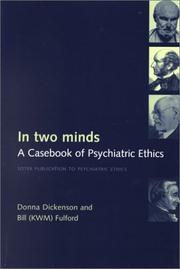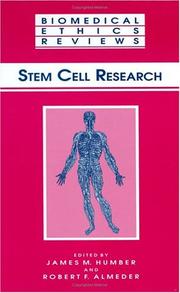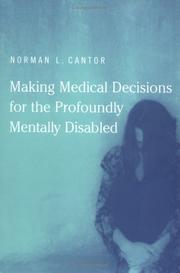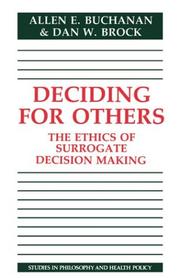| Listing 1 - 10 of 16 | << page >> |
Sort by
|

ISBN: 0192628585 Year: 2000 Publisher: Oxford ; New York : Oxford University Press,
Abstract | Keywords | Export | Availability | Bookmark
 Loading...
Loading...Choose an application
- Reference Manager
- EndNote
- RefWorks (Direct export to RefWorks)
psychiatrie --- psychiatrische patient (geesteszieke) --- casus (gevalstudie, gevalsstudie, gevallenstudie, praktijkcase) --- ethiek (ethische aspecten) --- patient psychiatrique (malade mentale) --- étude de cas --- ethique (aspects ethiques) --- Psychiatric ethics. --- Case studies --- Psychiatric ethics --- Mental health services ethics --- Medical ethics

ISBN: 2894000774 Year: 1996 Publisher: Montréal, Que Thémis
Abstract | Keywords | Export | Availability | Bookmark
 Loading...
Loading...Choose an application
- Reference Manager
- EndNote
- RefWorks (Direct export to RefWorks)
geïnformeerde vrijwillige toestemming (instemming) --- psychiatrische patient (geesteszieke) --- Verenigde Naties (VN) --- consentement libre et éclairé --- patient psychiatrique (malade mentale) --- Organisation des Nations Unies (ONU) --- Law of obligations. Law of contract --- Psychiatry
Book
ISBN: 9020944010 Year: 2001 Publisher: Tielt Lannoo
Abstract | Keywords | Export | Availability | Bookmark
 Loading...
Loading...Choose an application
- Reference Manager
- EndNote
- RefWorks (Direct export to RefWorks)
Na de dood van zijn vader kwam Hugo in een zware psychose terecht. Zijn vriendin Lotte vindt de instelling waar hij verblijft een veilige omgeving voor hem. Vincent tuimelde in een moment van twijfel uit het raam van zijn slaapkamer op de eerste verdieping. De housebeats van de lokale radio vormen in de instelling zijn strijdmuziek. Als klein kind leefde Anna al in een eigen wereld. Zonder pillen voelt zij zich ook in de instelling een echte controlefreak. Vijf weken lang verbleef journalist Guy Van Gestel op de psychiatrische afdelingen van verscheidene Vlaamse instellingen. Dag en nacht maakte hij er het wel en wee mee van de patiënten. Hij voerde lange gesprekken met hen, maakte uitvoerig aantekeningen en verwerkte zijn indrukken tot dit adembenemende document. In 'Te gek!' schetst hij een indringend portret van de gesloten wereld van de psychiatrie.
Psychiatrische patiënten. --- Psychiatrische ziekenhuizen. --- psychiatrie --- psychiatrische patient (geesteszieke) --- Vlaanderen --- Nederland --- #KVHB:Psychiatrie --- #KVHB:Psychiatrisch ziekenhuis --- #GSDBP --- #A0206A --- 673 Gezondheidsinstellingen --- Psychiatrische ziekenhuizen --- patient psychiatrique (malade mentale) --- Flandre --- Pays-Bas --- Hôpitaux psychiatriques --- 616 --- Psychiatrische centra --- Psychiatrische patiënten --- Psychiatrische verpleegkunde --- Psychiatrisch centrum --- Psychiatrische patiënt --- 610 --- gezondheid --- santé
Multi
ISBN: 9069162733 Year: 1997 Publisher: Nijmegen : Ars Aequi Libri,
Abstract | Keywords | Export | Availability | Bookmark
 Loading...
Loading...Choose an application
- Reference Manager
- EndNote
- RefWorks (Direct export to RefWorks)
In deze studie gaat het om de vraag wanneer iemand na een onvrijwillige opname in de psychiatrie aan dwang mag worden onderworpen zoals daar zijn: afzondering, fixatie, toedienen van medicatie of voeding en vocht, ... Respect voor zelfbeschikking eist dat dwang zoveel mogelijk wordt vermeden maar in de praktijk doen zich situaties voor waarin zelfbeschikkingsrecht plaats moet maken voor dwang. In dit boek wordt dwangtoepassing vanuit juridisch perspectief geanalyseerd. Let wel: het gaat hier om Nederlands recht en het boek dateert van 1997.
Mentally ill --- gedwongen behandeling (dwangbehandeling) --- gedwongen opname (collocatie) --- Nederland --- psychiatrische patient (geesteszieke) --- 347.15-057.36 <492> --- 364.4-056.36 --- 616.89 --- #GBIB:CBMER --- Insane --- Mental illness --- Mental patients --- Mentally disordered --- Sick --- People with mental disabilities --- Commitment and detention --- traitement forcé --- hospitalisation forcée (hospitalisation sous contrainte, hospitalisation non volontaire, collocation, internement) --- Pays-Bas --- patient psychiatrique (malade mentale) --- Patients --- Theses

ISSN: 07421796 ISBN: 1588294013 1588290212 0896038785 0896037835 0896035654 0896034402 089603352X 0896033260 0896032604 0896032655 089603240X 0896032205 0896030415 Publisher: Clifton (N.J.) : Humana press,
Abstract | Keywords | Export | Availability | Bookmark
 Loading...
Loading...Choose an application
- Reference Manager
- EndNote
- RefWorks (Direct export to RefWorks)
Provides articles by leading authorities who examine the medical, ethical, legal and philosophical issues involved in physician-assisted death, and scrutinize the principal arguments for and against it. Physician-Assisted Death is the eleventh volume of Biomedical Ethics Reviews. We, the editors, are pleased with the response to the series over the years and, as a result, are happy to continue into a second decade with the same general purpose and zeal. As in the past, contributors to projected volumes have been asked to summarize the nature of the literature, the prevailing attitudes and arguments, and then to advance the discussion in some way by staking out and arguing forcefully for some basic position on the topic targeted for discussion. For the present volume on Physician-Assisted Death, we felt it wise to enlist the services of a guest editor, Dr. Gregg A. Kasting, a practicing physician with extensive clinical knowledge of the various problems and issues encountered in discussing physician- assisted death. Dr. Kasting is also our student and just completing a graduate degree in philosophy with a specialty in biomedical ethics here at Georgia State University. Apart from a keen interest in the topic, Dr.Kasting has published good work in the area and has, in our opinion, done an excellent job in taking on the lion's share of editing this well-balanced and probing set of essays. We hope you will agree that this volume significantly advances the level of discussion on physician-assisted euthanasia. Incidentally, we wish to note that the essays in this volume were all finished and committed to press by January 1993.
geestelijke gezondheid (geestelijke gezondheidszorg, geestesziekte) --- gezondheidszorg --- psychiatrische patient (geesteszieke) --- #FHIW:CAT --- #GBIB:CBMER --- Ethics, Medical --- santé mentale (soins de santé mentale, maladie mentale) --- soins de santé --- patient psychiatrique (malade mentale) --- Medical Ethics --- Medicine --- Professionalism --- Bioethics --- ethics --- Professional ethics. Deontology --- Molecular biology --- Embryo Research --- Social Sciences and Humanities. Philosophy --- Stem Cells. --- Stem cells --- ethics. --- Systematics of Philosophy --- Ethics, Bioethics. --- Research --- Moral and ethical aspects. --- Medical ethics - Addresses, essays, lectures. --- Ethics, Medical - Periodicals.
Book
Abstract | Keywords | Export | Availability | Bookmark
 Loading...
Loading...Choose an application
- Reference Manager
- EndNote
- RefWorks (Direct export to RefWorks)
Chronische psychiatrische patiënten worden steeds meer begeleid buiten depsychiatrische inrichting. Diverse alternatieve voorzieningen komen totontwikkeling. Daarbij is een begeleidingsfilosofie ontstaan die onder debrede noemer van 'psychiatrische rehabilitatie' wordt beschreven.In dit boek behandelen een aantal grondleggers de basiselementen vanpsychiatrische rehabilitatie. Naast theoretische beschouwingen bevat hetboek praktische programma's. Het is bestemd voor iedereen die openigerlei wijze betrokken is bij of belangstelling heeft voorpsychiatrische rehabilitatie en de ontwikkeling vangemeenschapspsychiatrie.
Psychiatrie --- Psychotherapie --- Psychothérapie --- Therapieën --- Thérapies --- Psychiatrische patiënten --- 606.6 --- chronische psychiatrische patiënt --- psychiatrie --- psychiatrische patiënt --- rehabilitatie --- transmurale zorg --- #PBIB:2003.2 --- #PBIB:gift 2003 --- #SBIB:316.334.3M51 --- #SBIB:316.8H22 --- Academic collection --- psychiatrische patient (geesteszieke) --- zorg (zorgverstrekking, zorgverlening) --- 606.86 --- psychotherapie --- schizofrenie --- Psychiatrische patiënten (chronische psychiatrische patiënten) --- Rehabilitatie (arbeidsrehabilitatie) --- chronische psychiatrische patiënt (gez) --- rehabilitatie (gez) --- 615.86 --- Chronische ziekten --- Hulpverlening --- Rehabilitatie --- Schizofrenie --- psychiatrische verpleegkunde --- Organisatie van de gezondheidszorg: modellen van therapeutisch handelen --- Welzijnsorganisatie: sociale dienstverlening voor specifieke groepen --- patient psychiatrique (malade mentale) --- soins (prestation de soins) --- De psychiatrische patiënt --- Medische psychologie --- psychiatrische patiënten --- verpleging --- psychiatrie. --- verpleging. --- Psychiatrie. --- Verpleging. --- Provincie West-Vlaanderen
Book
ISBN: 9053509216 Year: 1999 Publisher: Leuven Apeldoorn Garant
Abstract | Keywords | Export | Availability | Bookmark
 Loading...
Loading...Choose an application
- Reference Manager
- EndNote
- RefWorks (Direct export to RefWorks)
In dit boek wordt nagegaan welke antwoorden de hulpverlening kan geven op complexe situaties van psychiatrische thuiszorg. Eerst schetsen de auteurs een exhaustief beeld van wat - vooral in het buitenland - reeds is gerealiseerd. Vervolgens wordt het begrip 'psychiatrische thuiszorg' nauwkeuriger gedefinieerd en gesitueerd binnen het geheel van de geestelijke gezondheidszorg. Ook wordt dieper ingegaan op de wet- en regelgeving en de beleidsintenties van de federale overheid alsook de Vlaamse overheid in België en Vlaanderen. Tenslotte worden de diverse elementen die samen de psychiatrische thuiszorg concreet (kunnen) uitmaken inhoudelijk gestructureerd en verwerkt als een 'lastenboek', d.w.z. een instrument waarmee diegenen die een project willen opzetten hun ideeën concreet vorm kunnen geven.1. INLEIDING2. PROBLEEMSTELLING3. ONDERZOEKSMETHODE4. BESTAANDE VOORBEELDEN EN "MODELLEN": VS, Canada, Australië, Italië, Frankrijk, Nederland, België.5. CONCEPTUELE SYNTHETISERING6. BELEID, WET- EN REGELGEVING OP FEDERAAL NIVEAU7. BELEID, WET- EN REGELGEVING VLAAMSE GEMEENSCHAP8. BESLUITEN BIJ BELEID, WET- EN REGELGEVING9. HET LASTENBOEK VOOR DE LOKALE PILOOTPROJECTEN10. ALGEMEEN BESLUIT
Assistance sociale --- Gezondheidszorg --- Maatschappelijk werk --- Psychiatrie --- Psychotherapie --- Psychothérapie --- Soins de santé --- Thuiszorg ; psychiatrische patiënten --- psychiatrische patient (geesteszieke) --- thuiszorg (gemeenschapszorg, zorg buiten het ziekenhuis) --- geestelijke gezondheid (geestelijke gezondheidszorg, geestesziekte) --- beleid (politieke aspecten) --- hulpverlening --- voorbeelden --- C6 --- thuiszorg --- psychiatrie --- 672 Gezondheidszorg. Behandeling --- psychiatrische thuisverpleegkunde --- 613.8 --- 616.890.8 --- Psychiatrische thuiszorg --- 606.84 --- psychiatrische verpleegkunde --- thuisverpleegkunde --- patient psychiatrique (malade mentale) --- soins à domicile (soins en communauté, soins non-hospitaliers) --- santé mentale (soins de santé mentale, maladie mentale) --- politique (aspects politiques) --- Opvoeding, onderwijs, wetenschap --- thuisverpleging --- (zie ook: psychologie) --- (zie ook: wijkverpleegkunde) --- geestelijke gezondheidszorg --- geestelijke gezondheidszorg (België) --- psychiatrische thuiszorg --- Psychiatry --- Psychiatric nursing --- Social policy and particular groups
Book
ISBN: 9046502430 Year: 2004 Volume: *10 Publisher: Mechelen Kluwer
Abstract | Keywords | Export | Availability | Bookmark
 Loading...
Loading...Choose an application
- Reference Manager
- EndNote
- RefWorks (Direct export to RefWorks)
Het cahier 'Psychiatrische zorg in de thuissituatie' (PZT) staat stil bij het wel en wee van mensen die ten gevolge van een psychische ziekte dreigen buitenspel gezet te worden. Soms slaat de ziekte toe als een zevenkoppig monster en wordt het normale functioneren zo bemoeilijkt dat opname of behandeling onvermijdelijk worden. Dit boek gaat over een behandelingsmodus die gedirigeerd wordt vanuit de thuissituatie, waarbij cliënt en begeleider samen instaan voor de regie. De auteurs nemen ons mee naar het dagelijks werkveld van de psychiatrische zorg in de thuissituatie (PZT). Ze geven ons een prima inkijk in de vele mogelijkheden van dit vrij nieuwe initiatief binnen de geestelijke gezondheidszorg. Enerzijds is er het verhaal van de psychisch zieke mens en anderzijds het verhaal van hoe je als hulpverlener je eigen weg, je eigen positie en evenwicht tracht te vinden binnen de delta van psychiatrische hulpverlening. In het boek kunt u het relaas van een jonge hulpverlener een eindje mee volgen. Doorheen zijn dagdagelijkse interventies, observaties en analyses kunnen we de draak met de 7 koppen geleidelijk aan ontcijferen. De ziekte wordt de geschiedenis van een mens en deze mens wordt invoelbaar. Het boek laat zien hoe psychiatrische patiënten, dankzij een professionele begeleiding, er toch in slagen om zich in het thuisnest te blijven handhaven.
Psychiatrische thuiszorg. --- Psychiatry --- Psychiatric nursing --- psychiatrische thuiszorg --- Thuiszorg ; psychiatrische patiënten --- Psychiatrische verpleegkunde --- Thuiszorg --- geestelijke gezondheid (geestelijke gezondheidszorg, geestesziekte) --- psychiatrische patient (geesteszieke) --- thuiszorg (gemeenschapszorg, zorg buiten het ziekenhuis) --- casuïstiek (gevallenstudie, gevalstudie) --- 606.84 --- psychiatrie --- psychiatrische verpleegkunde --- thuisverpleegkunde --- verpleegkunde --- 326 --- casestudies --- geestelijke gezondheidszorg --- gezinsverpleging --- gezondheidszorg --- mentaal gehandicapten --- psychiatrische gezinsverpleegkunde --- psychiatrische patiënt --- 616.89 --- Psychiatrische thuiszorg --- Geestelijke gezondheidszorg --- Psychiatrische verpleging --- santé mentale (soins de santé mentale, maladie mentale) --- patient psychiatrique (malade mentale) --- soins à domicile (soins en communauté, soins non-hospitaliers) --- casuistique --- psychiatrische verpleging --- Sociale problemen van en zorg voor mentaal gehandicapten; algemeen --- Psychiatrie --- gevallenstudie --- thuiszorg --- Ouderenzorg

ISBN: 0262033313 Year: 2005 Publisher: Cambridge MIT press
Abstract | Keywords | Export | Availability | Bookmark
 Loading...
Loading...Choose an application
- Reference Manager
- EndNote
- RefWorks (Direct export to RefWorks)
In this book, Norman Cantor analyzes the legal and moral status of people with profound mental disabilities -- those with extreme cognitive impairments that prevent their exercise of medical self-determination. He proposes a legal and moral framework for surrogate medical decision making on their behalf. The issues Cantor explores will be of interest to professionals in law, medicine, psychology, philosophy, and ethics, as well as to parents, guardians, and health care providers who face perplexing issues in the context of surrogate medical decision making. Thus, he claims, while profoundly mentally disabled persons are not entitled to make their own medical decisions, respect for intrinsic human dignity dictates their right to have a conscientious surrogate make medical decisions on their behalf. Cantor discusses the criteria that bind such surrogates. He asserts, contrary to popular wisdom, that the best interests of the disabled person are not always the determinative standard: the interests of family or others can sometimes be considered. Surrogates may even, consistent with the intrinsic human dignity standard, sometimes authorize tissue donation or participation in nontherapeutic medical research by profoundly disabled persons. Intrinsic human dignity limits the occasions for such decisions and dictates close attention to the preferences and feelings of the profoundly disabled persons themselves. Cantor also analyzes the underlying philosophical rationale that makes these decision-making criteria consistent with law and morals.
Conservatorships --- Informed consent (Medical law) --- Insanity (Law) --- Insanity --- Medical ethics --- Mental health laws --- Jurisprudence --- Decision making. --- psychiatrische patient (geesteszieke) --- autonomie van de patiënt --- wilsbekwaamheid (wilsonbekwaamheid, wilsbekwame patiënten, wilsonbekwame patiënten) --- persoon met een handicap (persoon met een mentale handicap, persoon met een lichamelijke handicap, persoon met een meervoudige handicap) --- persoon --- ethiek (ethische aspecten) --- recht (wetgeving, rechtspraak, rechtsbeginselen, juridische aspecten, aansprakelijkheid) --- patient psychiatrique (malade mentale) --- autonomie du patient --- capacité --- capacité (incapacité) --- personne handicapée (handicapé, handicapé mental, handicapé physique, polyhandicapé) --- personne --- ethique (aspects ethiques) --- droit (aspects juridiques, législation, jurisprudence, principes de droit, responsabilité) --- Biomedical ethics --- Clinical ethics --- Ethics, Medical --- Health care ethics --- Medical care --- Medicine --- Bioethics --- Professional ethics --- Nursing ethics --- Social medicine --- Conservators --- Guardian and ward --- Decision making --- Moral and ethical aspects --- Law and legislation

ISBN: 0521311969 052132422X 1139171941 9780521311960 9781139171946 9780521324229 Year: 1989 Publisher: Cambridge: Cambridge university press,
Abstract | Keywords | Export | Availability | Bookmark
 Loading...
Loading...Choose an application
- Reference Manager
- EndNote
- RefWorks (Direct export to RefWorks)
This book is the most comprehensive treatment available of one of the most urgent - and yet in some respects most neglected - problems in bioethics: decision-making for incompetents. Part I develops a general theory for making treatment and care decisions for patients who are not competent to decide for themselves. It provides an in-depth analysis of competence, articulates and defends a coherent set of principles to specify suitable surrogate decisionmakers and to guide their choices, examines the value of advance directives, and investigates the role that considerations of cost ought to play in decisions concerning incompetents. Part II applies this theoretical framework to the distinctive problems of three important classes of individuals, many of whom are incompetent: minors, the elderly and psychiatric patients. The authors' approach combines a probing analysis of fundamental issues in ethical theory with a sensitive awareness of the concrete realities of health care institutions and the highly personal and individual character of difficult practical problems. Its broad scope will appeal to health professionals, moral philosophers and lawyers alike.
autonomie van de patiënt --- wilsbekwaamheid (wilsbekwame patiënten) --- ethiek (ethische aspecten) --- minderjarigen --- bejaarde --- psychiatrische patient (geesteszieke) --- autonomie du patient --- capacité --- ethique (aspects ethiques) --- mineurs --- personne agée --- patient psychiatrique (malade mentale) --- Medical ethics --- Bioethics --- Medical jurisprudence --- Decision making --- Decision making. --- Moral and ethical aspects --- #GBIB:CBMER --- Forensic medicine --- Injuries (Law) --- Jurisprudence, Medical --- Legal medicine --- Biomedical ethics --- Clinical ethics --- Ethics, Medical --- Health care ethics --- Medical care --- Medicine --- Deciding --- Decision (Psychology) --- Decision analysis --- Decision processes --- Making decisions --- Management --- Management decisions --- Biology --- Life sciences --- Life sciences ethics --- Moral and ethical aspects&delete& --- Forensic sciences --- Medical laws and legislation --- Professional ethics --- Nursing ethics --- Social medicine --- Choice (Psychology) --- Problem solving --- Science --- Arts and Humanities --- Philosophy --- Medical ethics - United States - Decision making. --- Bioethics - United States - Decision making. --- Medical jurisprudence - Moral and ethical aspects - United States - Decision making. --- Decision making - Moral and ethical aspects - United States.
| Listing 1 - 10 of 16 | << page >> |
Sort by
|

 Search
Search Feedback
Feedback About UniCat
About UniCat  Help
Help News
News